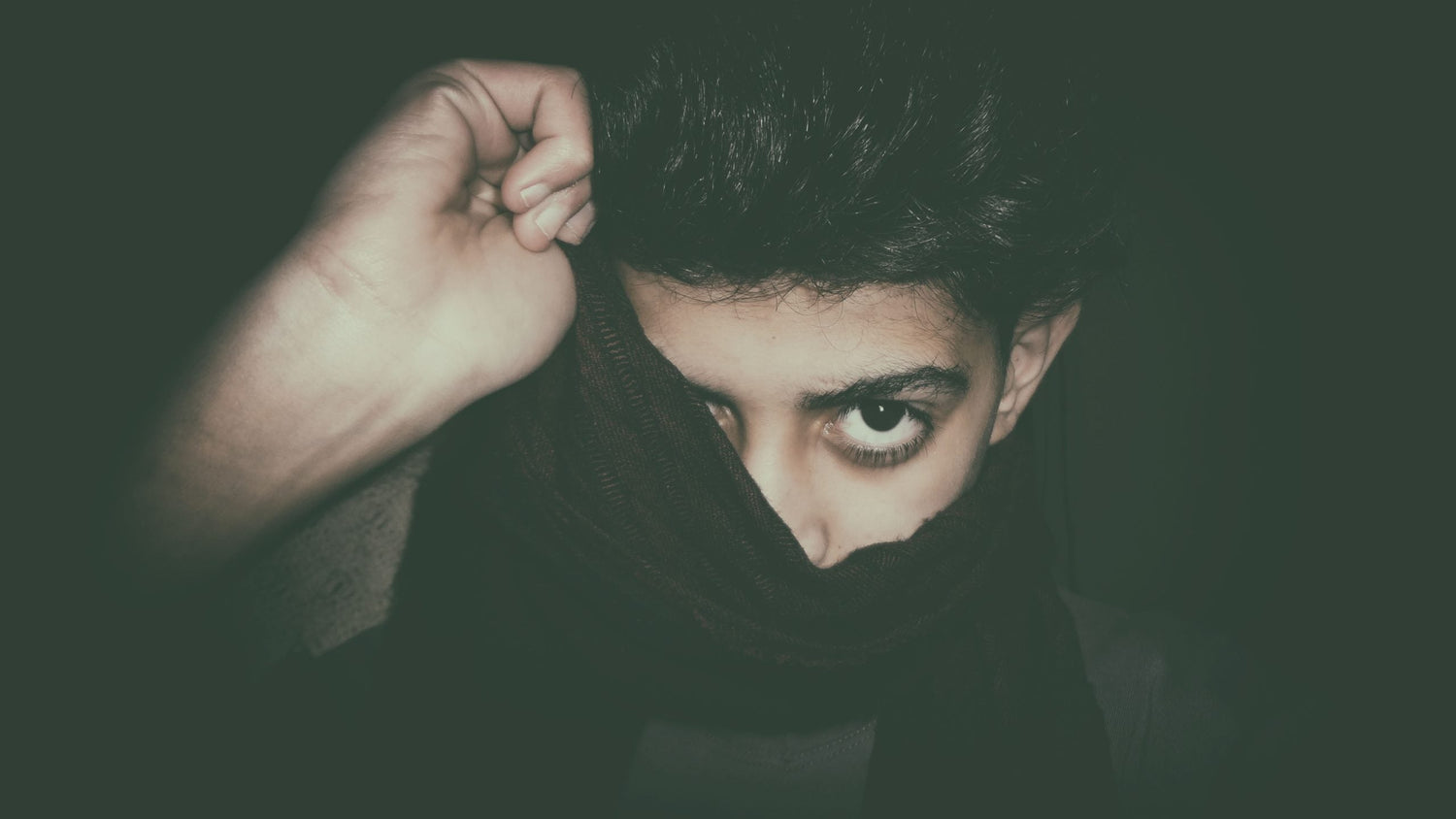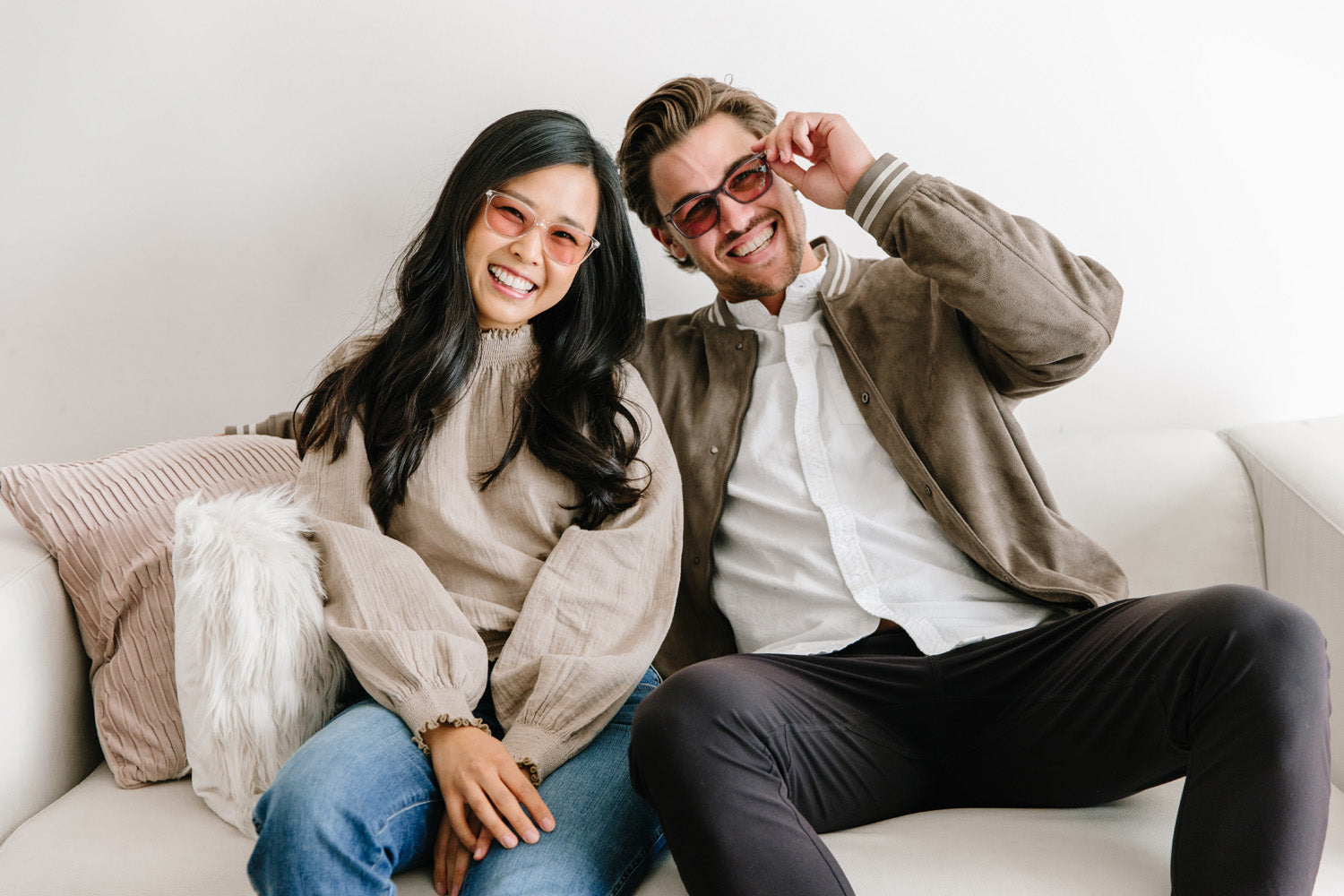If you regularly shut the blinds, turn off lights, or retreat into a dark corner of the room, you could be sensitive to light.
Putting on sunglasses might seem like an easy fix — even indoors. But donning extra dark sunglasses for sensitive eyes is a pretty bad idea that’s actually detrimental. Here’s why:
Extra Dark Lenses Teach Your Eyes to Love the Dark
Wearing any kind of sunglasses indoors might reduce your discomfort in the short-term, but make no mistake: any temporary reprieve comes with a massive drawback: the risk of dark-adapting your eyes, making you even more sensitive to light over time.
Dark adaptation means your retinas become so used to dim conditions that when you inevitably venture into normal light, it's super uncomfortable.
The last time you went to a matinee, do you remember how it felt walking out of the dark theater into the sun? Ouch! While you were in the theater, your eyes became adjusted to the darkness and just weren’t ready for daylight.

A similar phenomenon takes place when you wear sunglasses indoors. This applies whether they’re your average pair of sunglasses or the darkest lenses for sensitive eyes you can find.
A 2015 study published in the Elsevier Survey of Ophthalmology concluded that, “the use of sunglasses indoors must be strongly discouraged. By wearing dark sunglasses indoors, patients are dark-adapting their retinas and aggravating their sensitivity to light.”
A better solution to light sensitivity would be to wear light sensitivity glasses instead of sunglasses indoors.
Choosing Extra Dark Sunglasses for Outdoors
When you’re looking for sunglasses, your sensitive eyes might benefit from very dark lenses. It makes logical sense that blocking as much light as possible would help you feel better, but don’t simply look for the darkest lenses you can find. Let’s explore the different types of lenses and what they are good (or not good) for.
Essentially, in the United States, lenses fall into 5 categories of darkness. Specific industry standards for sunglasses are discussed here, but here are the basics.
Lens Category 0
This category has little to no tint and is usually used for prescription glasses, not sunglasses.
Lens Category 1
Lenses in Category 1 have more obvious tinting, but don’t offer enough protection from bright light. They offer only mild relief.
Lens Category 2
In Category 2, you have lenses that are about halfway between a very dark spectacle lens and a light sunglass lens. Less than half of the sunlight will be absorbed through the lens. These may offer average people enough protection for overcast to moderate days without super bright sunlight.
Lens Category 3
If you want darker lenses, Category 3 could be great for a bright day or every day. These are actually the darkest standard sunglasses you can get that are legal to drive with in the United States. These dark lenses provide a lot of sun reduction and a good level of UV protection.
While Category 3 lenses are ideal for outdoor sun protection, be sure to use them only outside. Inside, wear Axon Optics with Avulux® migraine and light sensitivity lenses. You should know, however, that the Avulux lens is also suitable for outdoors as it offers 100% UVA and UVB protection.
Lens Category 4 and 5
Categories 4 and 5 are not legal for driving because they block so much light that they make everything too dark. Category 5 lenses will actually block up to 92% of visible light. They’re probably more suited for eye protection during specialized sports in snowy conditions, where there is a lot of glare.
The Darkest Sunglasses for Sensitive Eyes Aren’t Made for Indoors – Try Glasses Made for Light Sensitivity
Sunglasses are made to darken any and all types of light. But people with light sensitive eyes need to remember that not all lighting is created equal. Some types of light on the spectrum (such as red, amber, and blue light) are more likely to be a problem than others. That’s why — instead of wearing extremely dark sunglasses indoors to block all types of light — it’s better to filter only the bothersome kind.
Axon Optics with Avulux lenses filter only the light that causes discomfort, letting the rest pass through. For people with light sensitivity, this is like protecting your light-sensitive eyes with the darkest sunglasses, but without dark-adapting your eyes.
“I love how the lenses are light enough not to make it feel dark in the room, but my eyes also feel like they instantly relax when wearing them in rooms with fluorescent lights and when I have to stare at a computer all day for work.” -Ronny
“I have suffered for years with migraines and sensitivity to lights. I have done botox, all types of medications to no avail. These light sensitivity glasses don’t stop the migraines, but do help. I can now open my blinds at home on a sunny day without being in pain, and also I can go into stores without having to wear my sunglasses.” -Cynthia
Sunglasses are made for the outdoors, and very dark sunglasses may serve light-sensitive people well for outdoor conditions. But for indoor lighting, even the most light-sensitive people are strongly encouraged to wear lenses that are specifically made to filter out only the harmful light.
FAQs About Dark Sunglasses for Sensitive Eyes
Why have my eyes become so sensitive to light?
There could be many reasons why your eyes have become more sensitive to light. One potential cause is an underlying condition called photophobia. People with photophobia are much more sensitive to light than your average person, experiencing pain, headaches, migraine attacks, nausea, dry eye, eye irritation, and more when exposed to levels of light that others might not find bothersome.
Other reasons for your light sensitivity could be recent eye surgery or dilated eye exam, eye infection, glaucoma, dry eye, allergies, concussion, keratitis, corneal abrasion, or an inflammatory eye disease like uveitis.
What color tint is best for light sensitivity?

The best tint for light sensitivity is available here at Axon Optics with Avulux lenses.
These lenses are designed to filter out the specific wavelengths of light that are the most bothersome to sensitive people, while letting the rest of the light in. This can help prevent unpleasant symptoms that harsh light can trigger like discomfort, nausea, or dizziness etc., without dark adapting your eyes.
Our lens filters even more of the harmful light than FL-41, and lets more good light in. They are available with or without a vision prescription. You can learn more here .
What are the best sunglasses for sensitive eyes?
The best sunglasses for sensitive eyes have lenses that filter out more harmful light. While Avulux lenses are made for indoors under any conditions like shopping or using a computer, they can also be used outdoors to filter the same wavelengths. They also provide UV protection, blocking 100% of UVB light from 280nm-315nm and 100% of UVA light from 315nm-380nm. They can be tailored to your vision prescription.
Which is more important: polarized lenses or UV protection?
You’ve probably heard people recommend either polarized or UV lenses. Let’s briefly explain the difference and then tell you which might offer the best protection.
Ultraviolet (UV) light is actually a type of radiation that exists at the very edge of the visible light spectrum. Too much of it can cause eye strain, dryness or temporary blindness (like when you catch glare off water or snow). Over the long run, overexposure to UV light can elevate your risk for eye diseases like macular degeneration or cataracts.
Polarized lenses are made using a very different process. Polarization on its own doesn’t protect against UV light, but does reduce glare by blocking scattered light. UV coatings may be added to polarized lenses, but that isn’t always the case.
There are other potential drawbacks to polarized lenses.
- They may not offer enough relief for people with light sensitivity. Because a polarized lens is so dark, it can’t absorb much of the precision tint Axon Optics glasses are made with that blocks the most bothersome types of light.
- Polarized lenses can also cause distortion in screens or other electronic displays, making them hard to view.
- Some people find this distortion triggers their photophobia symptoms, making them feel sick.
If you want eyewear for sensitive eyes, don’t use sunglasses indoors. Instead, try Axon Optics with Avulux lenses both indoors and out.
References
References
Kalloniatis, M., & Luu, C. (2007, July 9). Light and Dark Adaptation. Webvision.
https://webvision.med.utah.edu/book/part-viii-psychophysics-of-vision/light-and-dark-adaptation/
Kelechava, B. (2018, March 20). ANSI Z80.3-2018, Sunglasses Standard Revision. The ANSI Blog.
https://blog.ansi.org/2018/03/ansi-z80-3-2018-sunglasses-standard-revision/#gref





